 Society
Society

 |
| A volunteer donates blood at the "Red Sunday" blood donation programme, which took place on January 19, 2024, in the northern province of Lai Châu. — VNA/VNS Photo Nguyễn Oanh |
HÀ NỘI — Over the past three decades, Việt Nam has witnessed the strong development of the voluntary blood donation movement.
This has been a journey of sharing love, compassion, and solidarity among millions of Vietnamese hearts, bringing life and happiness to countless families of patients.
The voluntary blood donation movement originated during the war years when blood donation became a symbol of courage and comradeship. Soldiers selflessly shared their blood with comrades on the battlefield, despite limited and challenging medical conditions.
The Vietnam Military History Museum still preserves artefacts such as the blood donation list of medical personnel from Treatment Team 52, and blood collection strings used by medical personnel from Treatment Team 14 to collect 6.65 litres of blood for 58 wounded soldiers on the legendary Trường Sơn Trail.
Reflecting on the memories of those months caring for wounded soldiers on the legendary Trường Sơn Trail, veteran Nguyễn Thị Thoa, a nurse from Treatment Team 14, Battalion 12, Regiment 559, said that back then, blood transfusion was not like it is today.
There were no blood bags, no anticoagulants, so the blood was directly transfused to the wounded. When collecting blood, soldiers counted drops, calculating how many drops made up 1 ml, and how many millilitres constituted one unit of blood.
In the post-war era, blood transfusions were mainly carried out in large hospitals. The blood source mostly came from professional blood sellers and healthcare staff who donated blood, but the quantity of blood received was limited and could not meet the demand.
The significant transformation of the voluntary blood donation movement began in the early 1980s to change people's perception of blood donation. Professors Bạch Quốc Tuyên, Tôn Thất Tùng, and many leading experts nationwide conducted talks and consultations to encourage voluntary blood donation, using messages and slogans such as "The entire nation donates blood, family members donate blood", "One person needs blood - three family members donate blood", or "Deposit blood in the blood bank".
In the 1990s, as the country entered the renewal era, the demand for blood transfusions across all sectors increased significantly. During this time, the explosion of HIV/AIDS posed a serious risk to the safety of blood transfusions. Instances of blood shortages for treatment were frequent in healthcare facilities nationwide.
The first humanitarian blood donation event, organised on January 24, 1994, marked the beginning of a new chapter for the voluntary blood donation movement. It laid the foundation for the movement to expand to all segments of society, regardless of gender, age, occupation, religion or ethnicity.
The voluntary blood donation movement also witnessed innovation and creativity in approaches and campaign organisation. The use of technology, social media and other media channels helped spread the message and attract widespread participation from the public. Blood donation events have increasingly been organised in a professional and innovative manner, capturing the attention and involvement of a large number of people.
 |
| Minister of Health Đào Hồng Lan visited young patients undergoing treatment at the National Institute of Hematology and Blood Transfusion on January 20, 2024. — VNA/VNS Photo Minh Quyết |
Many ongoing activities continue to yield positive results, contributing to the widespread impact of the voluntary blood donation movement. These include campaigns such as the Lunar New Year (Tết) blood donation, the Red Spring Festival, the Red Drops and the Red Journey. The National Voluntary Blood Donation Day on April 7 and International Blood Donor Day on June 14 are also significant events.
Dr Nguyễn Ngọc Minh, former director of the Hematology and Blood Transfusion Centre in the central region, stated that over the past 30 years, the voluntary blood donation movement has fundamentally met the blood supply needs for clinical purposes, including patient treatment, surgeries and organ transplants.
In addition to supplying blood, the voluntary blood donation movement has contributed to the development and modernisation of the blood transfusion sector in Việt Nam. Blood screening and processing methods have been improved, enhancing the quality and efficiency of donated blood utilisation.
Recognition and rewards for voluntary blood donors are also emphasised. In 2007, the Central Hematology and Blood Transfusion Institute honoured 100 exemplary blood donors nationwide.
After 30 years of launching the movement, more than 21.3 million people nationwide have participated in blood donation, with tens of thousands of individuals being exemplary voluntary blood donors, some donating 30, 50, or even over 100 times.
 |
| Units of blood are collected for emergency and medical treatment. — VNA/VNS Photo Nguyễn Oanh |
By 2023, Việt Nam has made remarkable progress, receiving more than 1.5 million blood units, and the voluntary blood donation rate has reached 99 per cent.
The voluntary blood donation movement has become an integral part of Vietnamese culture and society, representing a sustained and long-term charitable action. The movement has attracted people from all walks of life such as the police force, the military, officials, workers, farmers, students, monks and nuns and Buddhists, all actively participating in voluntary blood donation.
Phạm Thị Quế Anh, a patient with congenital anemia, was diagnosed at the age of three and she is now 37.
“I've been receiving blood transfusions for over 30 years. Honestly, if not for blood transfusions, I don't think I would have lived to this day," she said.
Professor Nguyễn Anh Trí, former director of the Central Hematology and Blood Transfusion Institute, evaluated that the humanitarian blood donation movement has truly developed and is highly sustainable.
The pinnacle of this movement is the nationally significant blood donation events, some even gaining international recognition. Compared to the world, many countries took 50 years or even more to spread the voluntary blood donation movement as deeply and widely across the nation as Việt Nam has achieved, he added. — VNS
The Mekong Delta faces blood shortage during TếtCẦN THƠ — The Mekong Delta region are facing a shortage of blood for emergency and medical treatment, especially as the Tết (Lunar New Year) approaches.Dr Trần Ngọc Quế, director of the Central Blood Transfusion under the Central Institute of Hematology and Blood Transfusion, stated that during the three months around Tết, the institute needs 120,000 blood units for emergency and medical treatment.Particularly during this period, the Mekong Delta region has not yet resolved the blood reception issue. Therefore, the centre has to supply 1,000 blood units to Cần Thơ City every week, resulting in a higher demand than in previous years.Explaining the prolonged shortage of blood for treatment in this region, Quế said that since last March, the Cần Thơ Hematology and Blood Transfusion Hospital could not procure chemicals and biological products through bidding. Three months later, they were unable to buy blood bags, leading to the inability to receive blood. This situation resulted in a shortage of blood supply for hospitals in Cần Thơ and 74 hospitals in the Mekong Delta region.The Ministry of Health directed the Central Blood Transfusion, Chợ Rẫy Hospital, and the Hematology and Blood Transfusion Hospital in HCM City to supply blood and blood products to Cần Thơ City.From March to December 2023, 153,000 units and blood products had been supplied to Cần Thơ City.In 2024, Cần Thơ City has managed to overcome the shortage of biological products and chemicals but still could not bid for gifts for blood donors. The city has sent a letter to the Central Blood Transfusion requesting support for blood supply until this March.With blood scarcity during the Tết holiday, relying solely on blood supply from elsewhere without addressing the shortage of chemicals and biological products can be extremely dangerous in the event of mass accidents or catastrophic emergencies, Quế said.The Central Blood Transfusion is currently storing around 12,000-15,000 blood units, but the quantity is decreasing weekly due to the continuous supply to Cần Thơ City.To ensure emergency and medical treatment during the holiday, the Central Hematology and Blood Transfusion Institute urged people to donate blood, especially those with blood types O and B, as these two blood types are currently in shortage. — VNS




